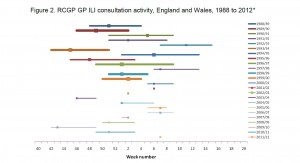Decipher my data! Flu! is the first in a planned series of projects. The study is led by Dr Rob Aldridge and his team at the Epidemiology and Infectious Diseases Centre at University College London. They want to see if school illness absence data can provide a good warning system for spotting flu outbreaks. Dr Rob has recorded a video, explaining what he and his team do, what the project’s about and why it matters, and most importantly whether the Incas also got Flu. Have a watch to find out!
Hang on … didn’t you do this last year?
One of the reasons we wanted to do this project was to show students that science doesn’t always produce a nice straight line or smooth curve and that quite often it doesn’t work at all! Last winter had the lowest incidence of flu on record and we learnt a lot about baseline illness data in schools but our results weren’t significant enough to publish.

We’ve learnt some lessons about what went well and what didn’t go so well last time so we’re hoping this year will be bigger and better and … sneezier!
What happens?
There are three stages to the project and each is covered by a detailed yet flexible Lesson Plan:
1. Context and consent
Stage one involves signing up your school to the project. As this is a bone fide research project we need you to get a consent form signed by your Headteacher. You may want to involve your students in this key scientific process. Lesson One will also help you set the context of epidemiology and data.
You’ll also need to fill in the school profile data. This includes details like the number of pupils in each year group and the number that receive free school meals.
2. Collect and analyse data
The data we want is the total number of half day weekly absences due to illness broken down by year group. There are standard reports for the two major registration systems used in secondary schools. Serco and Capita. You can access them here. Entering the data involves typing in 7 numbers per week. You can enter the data weekly or as often as you can manage. As soon as we see levels rising we will let you know to get your latest data up and to start analysing it.
Analysis is straightforward. We have a time trend analysis to compare your data with other schools aggregated into regions and against the national trends reported by the HPA.
We also have XY scattergraphs to allow you to look for patterns against the data given in school profiles.
There is more in Lesson Plan Two.
3. Reporting
Students can individually use the Lab-Logs feature to note things they find interesting throughout the project. These can form the basis of the report that your class or group can produce to communicate your findings to Dr Rob and the UCL team.
Finally, your students can have the chance to Peer Review the work produced by another school. Doing this exposes them to another vital aspect of the scientific process.
Once reports have been reviewed then Dr Rob will write up the findings as an academic paper to be published in a respected journal.
Who’s it for?
The Flu! study is flexible and can be used for a range of secondary school classes or a STEM club. The lesson plans are aimed at years 8 & 9 but can be adapted to other student’s needs.
Last year teachers used it in a variety ways: whole class, STEM Club, extension work for AGT students, self-run projects for 6th form science students.
When is this happening?
- Now – registration and consent open
- October 2012 – data collection starts
- By end of March 2013 – Write reports and peer review other schools’ work
- June 2013 – UCL team produce draft paper for review by schools.
I’m a teacher, how do I get involved?
You need to register and then get a consent form signed by your headteacher. Once we have that form back you’ll be able to start collecting and analysing data with your class or STEM Club.
Need more information?
For more information on whats involved see our teacher’s page and teacher’s FAQ section. If you require any more info, please contact me (Katie) and I’ll be happy to answer any questions you may have.



2 Responses to About the project